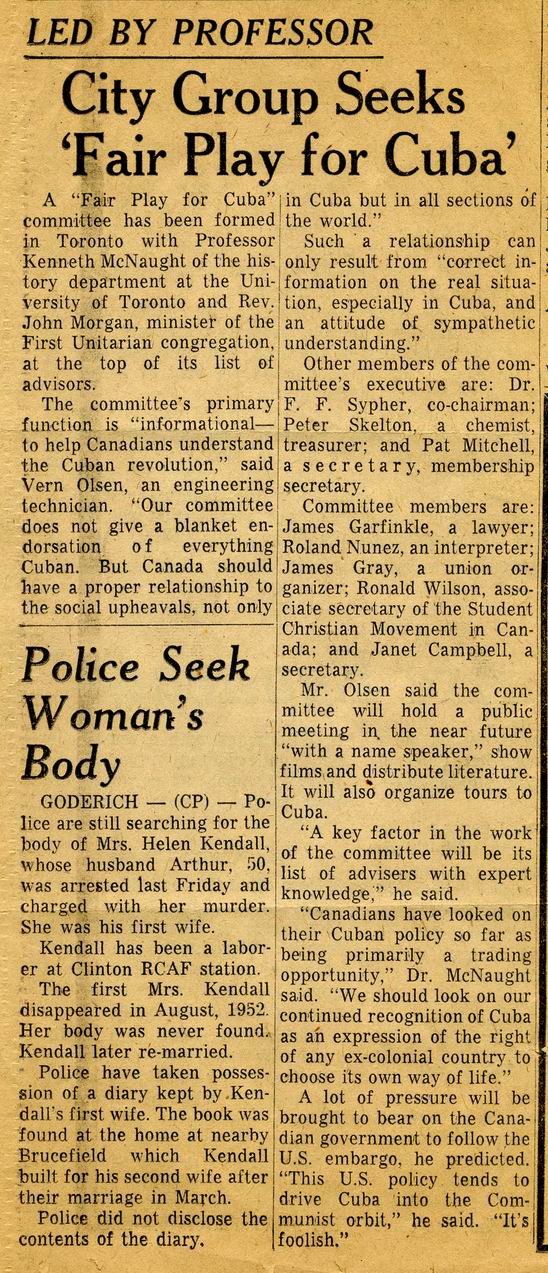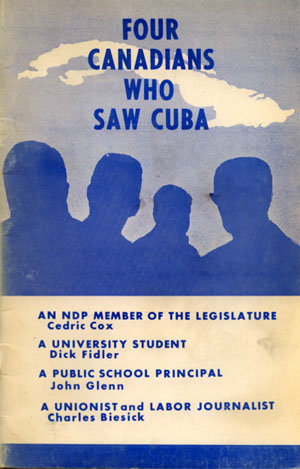
Information to change the world | |
Find Topics, Titles, Names related to your query |

Information to change the world | |
Find Topics, Titles, Names related to your query |
|
|
Fair Play for Cuba CommitteeThe Fair Play for Cuba Committee (FPCC) was an organization established in April 1960, with its U.S. headquarters in New York City. Its purpose was to provide grassroots support for the Cuban Revolution led by Fidel Castro, and to challenge the U.S. government’s economic boycott of Cuba. In January 1959, Castro’s military campaign had overthrown the dictatorship of Fulgencio Batista. In its first 100 days in office, Castro’s government passed several laws benefitting the people of Cuba. Rents were cut for low-wage earners; property owned by Batista and his ministers was confiscated; the telephone company was nationalized and rates greatly reduced; land was redistributed to poor peasants; and whites-only facilities across the island were abolished. Several of these laws upset the U.S. elites. Much of the land redistributed to peasants, as well as the telephone company, had been owned by U.S. corporations. The U.S. government responded by telling Castro they would no longer be willing to provide technology and technicians needed to help run Cuba’s economy. When Castro refused to be intimidated, U.S. President Eisenhower announced that the U.S. would no longer buy sugar from Cuba. In April 1960, two CBS newsmen, Robert Taber and Richard Gibson, ran a full-page ad in the New York Times, making a statement on the importance of the Cuban revolution. The authors received more than a thousand letters of support, and as a result, they founded the Fair Play for Cuba Committee that same month. The FPCC maintained that Cubans had the right to choose their own government, and that Castro was not a puppet of the Soviets. The main objective of the FPCC was for the U.S. to end its economic boycott of Cuba. The FPCC’s early supporters included Norman Mailer, Truman Capote, James Baldwin, Jean-Paul Sartre, Simone de Beauvoir, Allen Ginsberg, Lawrence Ferlinghetti, Waldo Frank, Alan Sagner, Carleton Beals, Dan Wakefield, and Linus Pauling. By 1961 the FPCC had 7,000 members in 27 “adult chapters” and 40 “student councils” across the U.S. and Canada. Although the group did not have a significant impact on the US policy towards Cuba, it quickly became a target of CIA investigations. The CIA focused its efforts on the organization in 1960, when the Los Angeles Chapter of the FPCC held a press conference to draw attention to reports of the CIA training armed forces to intervene in Cuba. (These preparations culminated in the Bay of Pigs invasion in April 1961.) The FBI also became interested in the FPCC in 1961, when FBI director J. Edgar Hoover began targeting pro-Castro activists. An FBI agent, Victor Thomas Vincente, infiltrated the FPCC and was able to steal the mailing list of the organization and hand it over to the FBI. He also let agents into the Tampa, Florida chapter when he was given temporary supervisory powers in April 1963. In 1963, Lee Harvey Oswald requested permission from the FPCC to open a chapter in New Orleans. Before he received a response, he rented an office and began printing flyers in support of the organization. Oswald was the only member of the FPCC Chapter in New Orleans. Nonetheless, the FPCC was shut down after the assassination of President John F. Kennedy in November 1963. FPCC in Canada The Toronto chapter of FPCC was established in February 1961. It quickly won support from the CCF-NDP, unions, academics and churches. The FPCC was active in Canada throughout the early 1960s. Because Canadians were able to travel freely to Cuba, there were several instances of Canadian members of the FPCC travelling to Cuba and returning to Canada to speak about and publish their experiences. For example, in 1963, four members of Canadian chapters of FPCC published a pamphlet on their travels in Cuba. The four men were Cedric Cox, member of the BC legislature, John Glenn, an Ontario public school principal, Charles Biesick, a journalist and unionist, and Dick Fidler, a University of Toronto student. Upon their return, they published a pamphlet which described the living conditions and the impact of the embargo on Cuba. They spoke out in support of the Revolution and the Castro government, and claimed to have been harassed by CIA agents during their travels. In Toronto the FPFC chapter was smeared by damaging allegations in the Toronto Telegram as being “communist,” with the RCMP issuing a statement that the chapter was under investigation. References Simkin, John. Fair Play for Cuba Committee. Spartacus Educational. 2014. Cuba 1959 to 1980s: The Unforgivable RevolutionSubject headings   |
Connect with Connexions



|